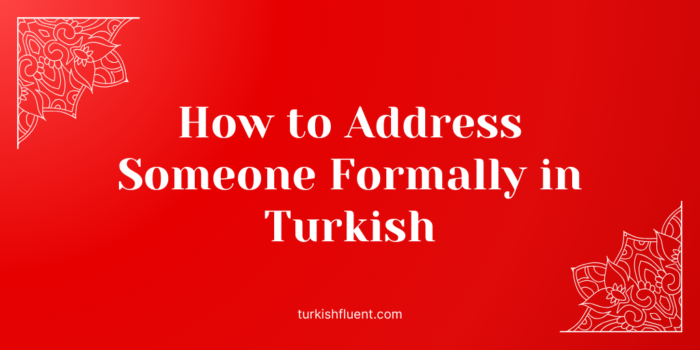Understanding how to address someone formally in Turkish is essential for respectful communication in professional, academic, or social contexts. This article explores the use of the formal “you” pronoun, honorifics titles, and examples to help you sound natural and polite.
Table of Contents
The Formal “You” Using “Siz”
In Turkish, formality is primarily expressed through pronouns. While “sen” is used for informal and familiar contexts, “siz” is the formal equivalent of “you” and is also the plural form. Using “siz” demonstrates respect and is appropriate in the following contexts:
- Speaking to elders
- Addressing strangers
- Interacting with professionals or authority figures
For example in present form:
| Informal (sen) | Formal (siz) |
|---|---|
| Sen nasılsın? (How are you?) | Siz nasılsınız? (How are you?) |
| Senin adın ne? (What is your name?) | Sizin adınız nedir? (What is your name?) |
Notice that the verb conjugation changes when using “siz,” as shown above.
Addressing People Formally in Turkish
Honorific titles and polite expressions are commonly used for formal addressing. Here are some examples:
- Efendim (Sir/Madam): A versatile term that conveys respect and is often used when answering calls or addressing someone whose name or title is unknown. Note: people also use “Efendim?” when they didn’t understand something and ask to repeat. It translates to “Pardon?” or “Excuse-me”.
- Beyefendi (Mr./Gentleman): Used to address men politely.
- Hanımefendi (Mrs./Ms./Lady): Used to address women politely.
- Sayın (Esteemed): Frequently used in written communication or when addressing someone formally in a speech (e.g., Sayın Ahmet Bey).
Examples of formal addressing:
- Ahmet Bey (Mr. Ahmet)
- Fatma Hanım (Ms. Fatma)
- Sayın Doktor Ayşe Hanım (Esteemed Doctor Ayşe)
- Müdür Bey (Mr. Manager)
- Hanımefendi, yardımcı olabilir misiniz? (Madam, could you help me?)
Examples of Formal Sentences in Turkish
Here are 10 sentences demonstrating the use of “siz” and formal addressing:
- Sizin adınız nedir, efendim? (What is your name, sir/madam?)
- Ahmet Bey, bu konu hakkında ne düşünüyorsunuz? (Mr. Ahmet, what do you think about this topic?)
- Hanımefendi, toplantı başlamak üzere. (Madam, the meeting is about to start.)
- Sayın Öğretmenim, bir sorum var. (Esteemed Teacher, I have a question.)
- Siz bu projeye katılmak ister misiniz? (Would you like to join this project?)
- Doktor Hanım, ne zaman randevu alabilirim? (Doctor, when can I get an appointment?)
- Müdür Bey, dosyalar hazır. (Mr. Manager, the files are ready.)
- Siz memnun kaldınız mı, efendim? (Were you satisfied, sir/madam?)
- Hanımefendi, lütfen burada bekleyiniz. (Madam, please wait here. ; see our guide on the imperative to understand the conjugation here)
- Sayın Ahmet Bey, sunum için teşekkür ederiz. (Esteemed Mr. Ahmet, thank you for the presentation.)
Formal Turkish can be used in a lot of situations when you are visiting Türkiye. By mastering these structures and phrases, you can navigate formal situations in Turkish with ease and confidence.
